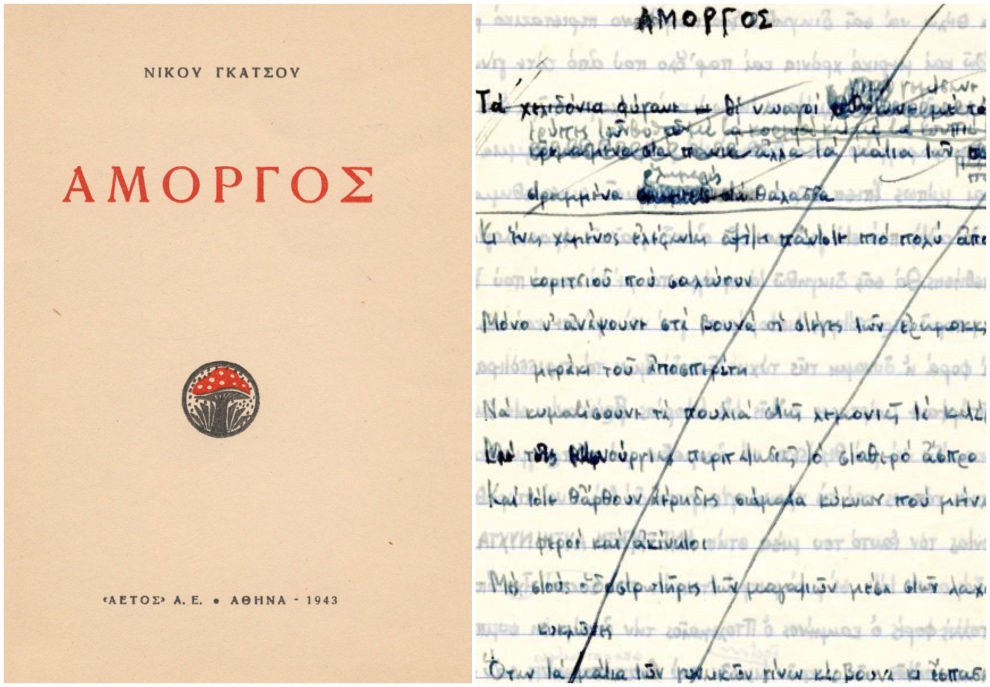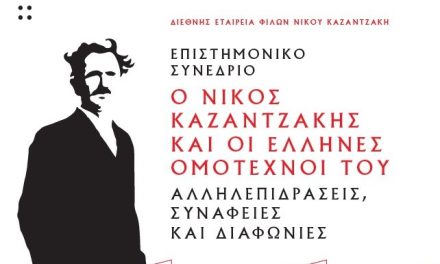Nikos Gatsos’s profoundly mysterious and magnetic poem Amorgos, named after a Greek island he never visited and written during the Nazi occupation, is the single work on which his reputation rests. It is a wonderful incantation on the theme of loss and hope – a unique blend of surrealism, symbolism and folk song – lyrical and erotic, sometimes celebratory, sometimes bitter. It was much admired by the Nobel laureates Odysseus Elytis and George Seferis, and was hugely influential on the postwar generation of Greek poets.
[An excerpt]
[Translated by Kimon Friar and published in Poetry (Special volume on New Greek Poets, An Anthology and Commentary], 78:3 (June, 1951)].
Written in one night of inspired concentration, Amorgos was a distinctive re-imagining of the Greek poetic tradition, composed at a time of mortal danger for the Greek people. It is a polyphonic poem that synthesizes elements of the Greek literary tradition into an intertextual palimpsest of fragments, in the vein of the modernist ‘long poem’. “A memorable work of Modern Greek Letters”, said his close friend Manos Hatzidakis of Amorgos,“because it contains the deepest sense of Greek tradition, it does not exploit it, and at the same time it contains the European military service of the period between the wars”.
The surrealist poet maintains a fine balance between tradition and radical innovation, shaping Amorgos as a place where poetry is created as an interaction of opposing tendencies. The topical character of the poem is underscored by its title: the sea-and-land imagery evokes the island as a literary topos of seclusion and self-sufficiency that lends its characteristics to the composition itself: a ‘compendium’ of poetic writing and avant-garde aesthetics.

The Poet
Poet, lyricist critic and translator, Nikos Gatsos stands apart in the annals of Greek literature. He was born in the village of Asea, in Arcadia in the Peloponnese, and went to school in Tripoli and Athens. By the time he entered the University of Athens to study philosophy he was already a fluent speaker of English and French. In Athens he came into contact with literary figures, particularly the poet Odysseus Elytis, with whom he formed a life-long friendship.
His first collections of verse, short poems written in a classical style, were published in the magazines Nea Estia (1931) and Rythmos (1933). For most of the decade, however, he dedicated himself to reviews and literary criticism. In 1943, during the Nazi occupation of Greece, Gatsos published his major work, the surrealist epic poem Amorgos. Amorgos was soon recognized as a major work, but proved to be the only book Gatsos published in his career. He later published three more poems, Elegeio in 1946, The Knight and Death in 1947 and Song of Old Times in 1963.
Following World War II, Gatsos worked for the Greek British Review as a translator and also for the Greek Radio Television as a translator, arranger and radio director, while he also became involved in translating theatrical plays for the National Theatre of Greece, the Art Theatre and the Folk Theatre. After part of Amorgos was set to music by Manos Hadzidakis, he established a new and influential role as a lyricist for Greece’s most popular composers, notably Hadzidakis, Theodorakis, Xarhakos, among others. Many of his songs are of great beauty and clarity, and helped to introduce a rare quality into Greek popular music.
In later years Gatsos established himself as a unique literary figure in Greece. Holding court in various Athenian cafés, he attracted intellectuals and writers, both foreign and Greek, and gave firm but gentle guidance to aspiring poets. In 1987, he was honoured with the Municipality of Athens Award and in 1991 he was elected corresponding member of the Academy of Barcelona. He died in Athens in 1992, and was buried in the village of his birth, as he had requested.
A.R.
![]()
TAGS: LITERATURE & BOOKS | READING GREECE














